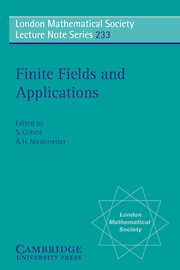 Finite Fields and Applications
Finite Fields and Applications Published online by Cambridge University Press: 29 September 2009
Abstract
We discuss a number of open problems and conjectures in the theory and application of finite fields. We also provide a brief discussion of the status as well as references related to each problem.
Introduction
In this paper we try to summarise some interesting and/or important questions in the theory and application of finite fields. These questions obviously reflect our personal tastes but we have indeed tried to consider questions of general interest. We hope that these questions and even more, the methods developed for their solutions, will be of interest to other researchers. The reader may wonder why some questions we call ‘Problems’ and some we call ‘Conjectures’. Roughly speaking, we use the term Conjecture if we (and very often others) believe the statement to be true while the term Problem is used to indicate all other statements. In general we feel that our conjectures may be more difficult to resolve than our problems.
The standard notions of the theory of finite fields which we use can be found in the finite field bible by Lidl and Niederreiter.
Combinatorics
There are numerous open problems in combinatorics which are related to finite fields. In this section we briefly describe several of these. We begin with several questions related to latin squares. A latin square of order n is an n × n array based upon n distinct symbols with the property that each row and each column contains each of the n symbols exactly once.
To save this book to your Kindle, first ensure [email protected] is added to your Approved Personal Document E-mail List under your Personal Document Settings on the Manage Your Content and Devices page of your Amazon account. Then enter the ‘name’ part of your Kindle email address below. Find out more about saving to your Kindle.
Note you can select to save to either the @free.kindle.com or @kindle.com variations. ‘@free.kindle.com’ emails are free but can only be saved to your device when it is connected to wi-fi. ‘@kindle.com’ emails can be delivered even when you are not connected to wi-fi, but note that service fees apply.
Find out more about the Kindle Personal Document Service.
To save content items to your account, please confirm that you agree to abide by our usage policies. If this is the first time you use this feature, you will be asked to authorise Cambridge Core to connect with your account. Find out more about saving content to Dropbox.
To save content items to your account, please confirm that you agree to abide by our usage policies. If this is the first time you use this feature, you will be asked to authorise Cambridge Core to connect with your account. Find out more about saving content to Google Drive.